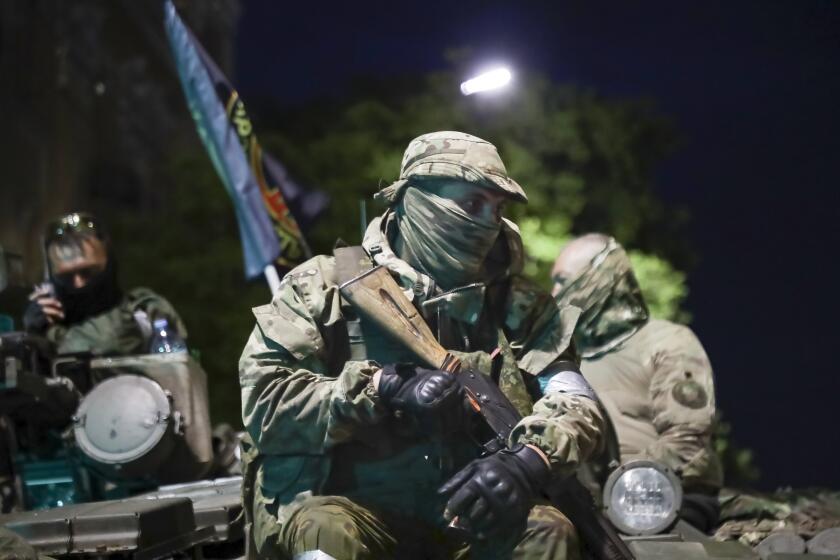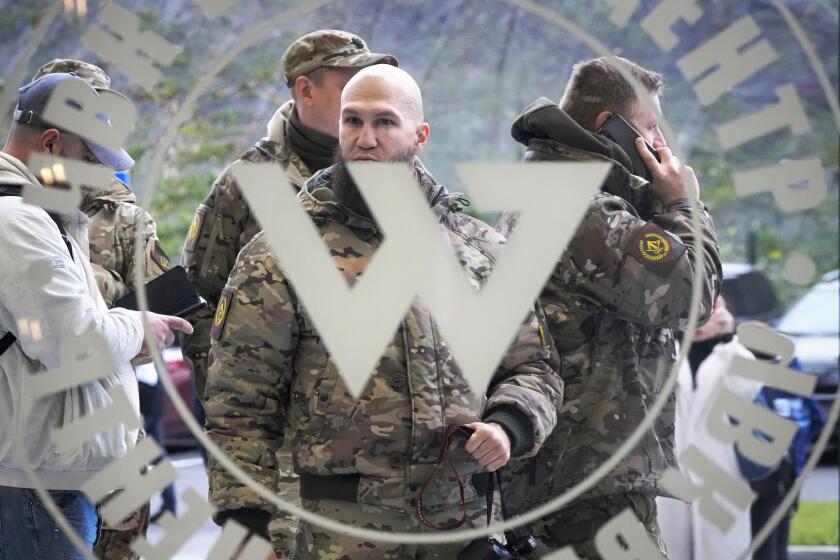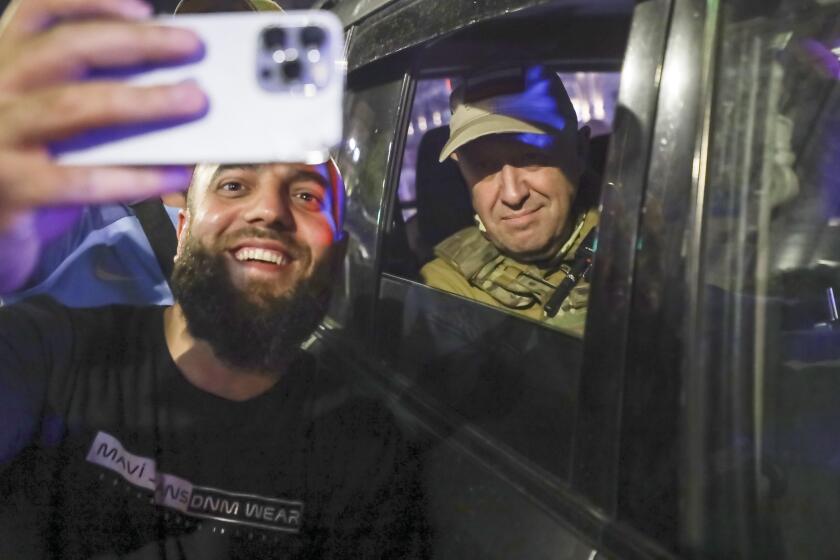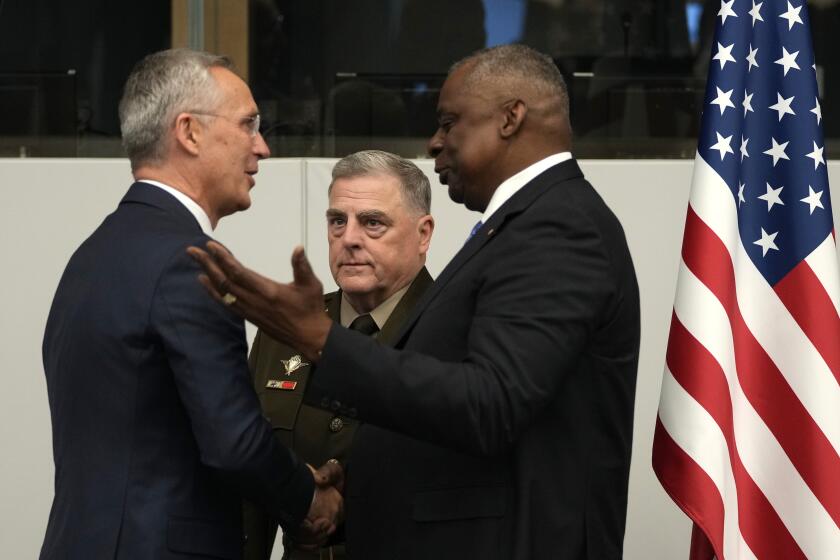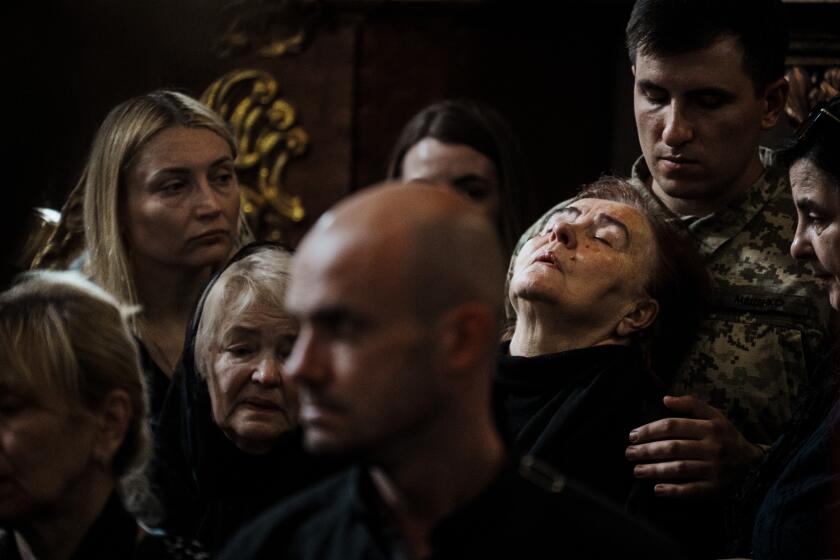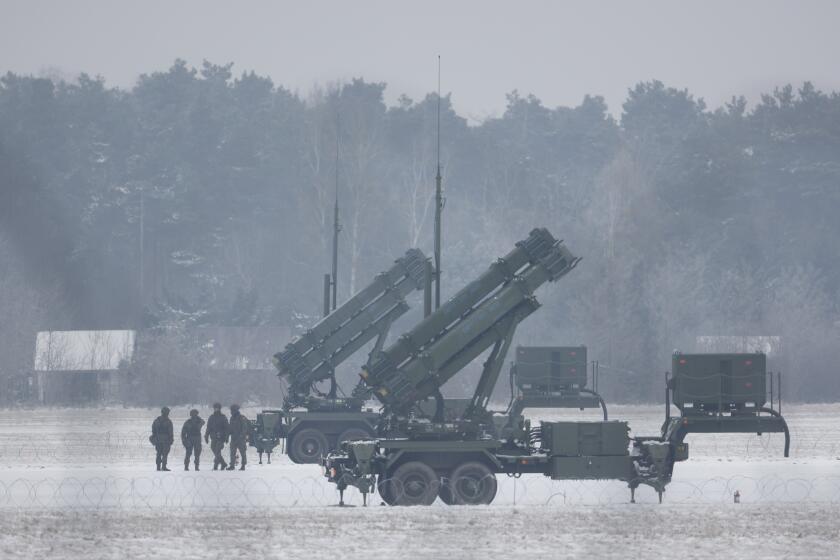Putin says the aborted rebellion played into the hands of Russia’s enemies
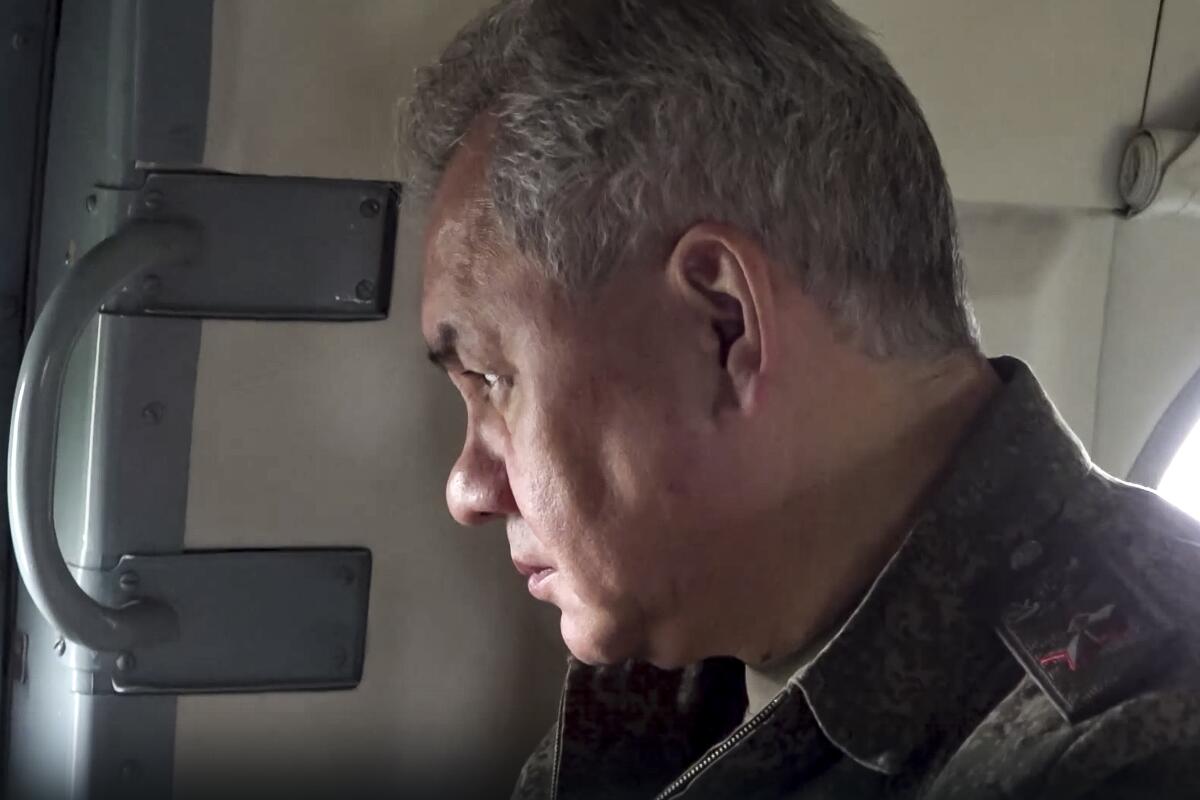
- Share via
Russian President Vladimir Putin on Monday blasted organizers of a weekend revolt as “traitors” who played into the hands of Ukraine’s government and its allies. The rebellion by armed mercenaries, which lasted less than 24 hours, was the gravest threat yet to Putin’s authority.
Putin said the nation had stood united, and he praised the rank-and-file mercenaries for not letting the situation descend into “bloodshed.”
Earlier in the day, the rebellion’s leader, mercenary chief Yevgeny Prigozhin, defended his short-lived insurrection. He taunted Russia’s military, but said he hadn’t been seeking to stage a coup.
Putin did not name Prigozhin in his televised address but said organizers of the mutiny had tried to force the group’s soldiers “to shoot their own.” Putin blamed “Russia’s enemies” and said they “miscalculated.”
With the shocking mutiny by Russia’s Wagner mercenaries put down for now, Moscow and Kyiv both work to calculate where their war goes from here.
The Kremlin also showed Putin meeting with top security, law enforcement and military officials. Early in the day authorities released a video of Russian Defense Minister Sergei Shoigu, whose removal Prigozhin had demanded, reviewing troops in Ukraine.
Prigozhin said he was acting to prevent the destruction of Wagner, his private military company.
“We started our march because of an injustice,” he said in an 11-minute statement, giving no details about his location or plans.
The feud between the Wagner Group leader and Russia’s military brass has festered throughout the war, erupting into a mutiny over the weekend when mercenaries left Ukraine to seize a military headquarters in the southern Russian city of Rostov. They rolled seemingly unopposed for hundreds of miles toward Moscow before turning around after less than 24 hours on Saturday.
The Kremlin said it had made a deal for Prigozhin to move to Belarus and receive amnesty, along with his soldiers. There was no confirmation of his whereabouts Monday.
Russian private military contractor Wagner is busy boosting its brand as its fighters try to subdue Ukraine, trading secrecy for war propaganda movies.
Prigozhin boasted Monday that his march was a “master class” on how Russia’s military should have carried out the February 2022 invasion of Ukraine. He also mocked the military for failing to protect Russia, pointing out security breaches that allowed Wagner to march 500 miles toward Moscow without resistance.
His statement made no clearer what would happen to Prigozhin and his forces under the deal purportedly brokered by Belarusian President Alexander Lukashenko.
Prigozhin said Lukashenko “proposed finding solutions for the Wagner private military company to continue its work in a lawful jurisdiction.” That suggested Prigozhin might keep his military force, although it wasn’t immediately clear which jurisdiction he was referring to.
The independent Russian news outlet Vyorstka claimed that construction of a field camp for up to 8,000 Wagner troops was underway in Belarus, but the report couldn’t be independently verified. The Belarusian military monitoring group Belaruski Hajun said Monday on Telegram that it had seen no activity in the area consistent with the report.
Some were buoyed by the news that Yevgeny Prigozhin’s forces were halting their march to Moscow. Others dismissed the armed rebellion as an insignificant development.
Though the mutiny was brief, it was not bloodless. Russian media reported that Wagner forces shot down several military helicopters and a communications plane, killing at least 15. Prigozhin expressed regret for attacking the aircraft but said they were bombing his convoys.
Russian media reported that a criminal case against Prigozhin hasn’t been closed, despite earlier Kremlin statements, and some Russian lawmakers called for his head.
Andrei Gurulev, a lawmaker and retired general who has clashed with the mercenary leader, said Prigozhin and his right-hand man Dmitry Utkin deserve “a bullet in the head.”
And Nikita Yurefev, a city council member in St. Petersburg, said he filed an official request with Russia’s Prosecutor General’s Office and the Federal Security Service, or FSB, asking who would be punished for the rebellion, given that Putin vowed in a Saturday morning address to punish those behind it.
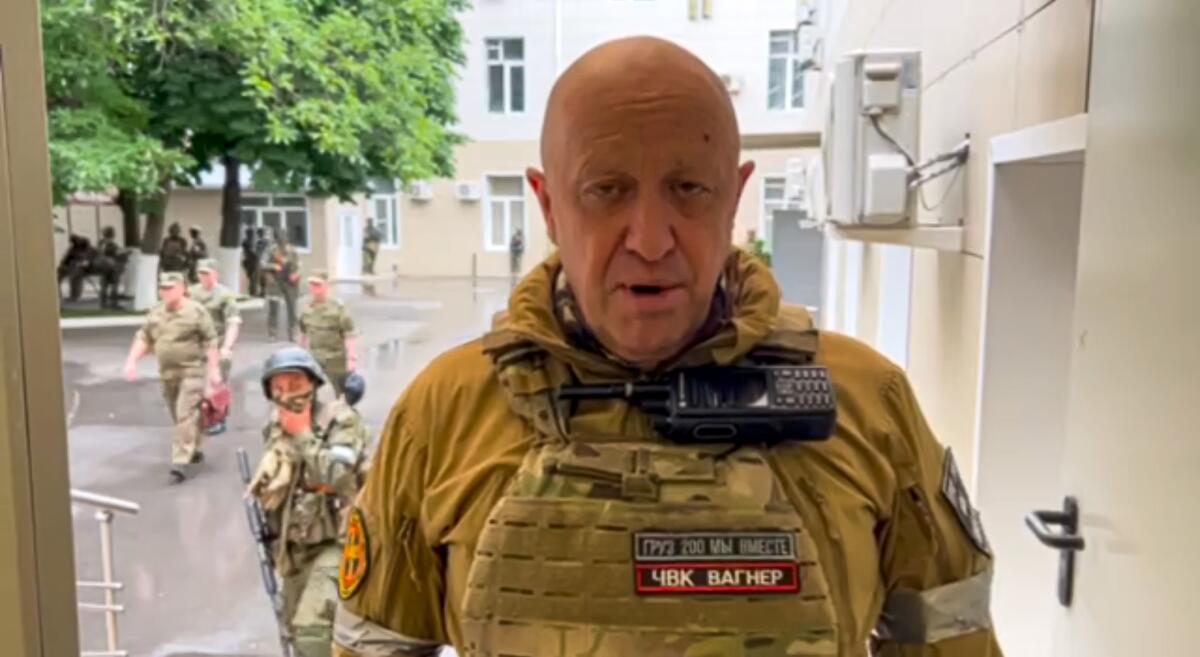
It was unclear what resources Prigozhin can draw on, and how much of his substantial wealth he can access. Police searching his St. Petersburg office amid the rebellion found $48 million worth of rubles in trucks outside the building, according to Russian media reports confirmed by the Wagner boss. He said the money was intended to pay his soldiers’ families.
Russian media reported that Wagner offices in several Russian cities had reopened Monday and that the company had resumed enlisting recruits.
In a return to at least superficial normality, Moscow’s mayor announced an end to the “counterterrorism regime” imposed on the capital Saturday, when troops and armored vehicles set up checkpoints on the outskirts and authorities tore up roads leading into the city.
NATO says the alliance has seen no evidence that Russia has changed its nuclear posture despite bellicose comments from Belarus, a Moscow ally.
The Defense Ministry published video of Shoigu in a helicopter and then meeting with officers at a military headquarters in Ukraine. It was unclear when the video was shot. It came as Russian media speculated that Shoigu and other military leaders have lost Putin’s confidence and could be replaced.
Before the uprising, Prigozhin had blasted Shoigu and General Staff chief Gen. Valery Gerasimov with expletive-ridden insults for months, accusing them of failing to provide his troops with enough ammunition during the fight for the Ukrainian town of Bakhmut, the war’s longest and bloodiest battle.
Prigozhin’s statement appeared to confirm analysts’ view that the revolt was a desperate move to save Wagner from being dismantled after an order that all private military companies sign contracts with the Defense Ministry by July 1.
Breaking News
Get breaking news, investigations, analysis and more signature journalism from the Los Angeles Times in your inbox.
You may occasionally receive promotional content from the Los Angeles Times.
Prigozhin said most of his fighters refused to come under the Defense Ministry’s command, and the force planned to hand over the military equipment it was using in Ukraine on June 30 after pulling out of Ukraine and gathering in the southern Russian city of Rostov-on-Don. He accused the Defense Ministry of attacking Wagner’s camp, prompting them to move sooner.
Russian political analyst Tatiana Stanovaya said on Twitter that Prigozhin’s mutiny “wasn’t a bid for power or an attempt to overtake the Kremlin,” but a desperate move amid his escalating rift with the military leadership.
While Prigozhin could get out of the crisis alive, he doesn’t have a political future in Russia under Putin, Stanovaya said.
It was unclear what the fissures opened by the 24-hour rebellion would mean for the war in Ukraine, where Western officials say Russia’s troops suffer low morale. Wagner’s forces were key to Russia’s only land victory in months, in Bakhmut.
Even far from Ukraine’s front lines, military funerals set off waves of mourning. ‘You can’t see an end to it,’ one chaplain says as the war drags on.
The U.K. Ministry of Defense said Monday that Ukraine had “gained impetus” in its push around Bakhmut, making progress north and south of the town. Ukrainian forces claimed to have retaken Rivnopil, a village in southeast Ukraine that has seen heavy fighting.
President Biden and leaders of several of Ukraine’s European allies discussed the events in Russia over the weekend, but Western officials have been muted in their public comments.
Biden said Monday that the U.S. and NATO were not involved in the short-lived insurrection. In remarks at the White House, Biden explained that he was cautious about speaking publicly because he wanted to give “Putin no excuse to blame this on the West and blame this on NATO.”
“We made clear that we were not involved, we had nothing to do with it,” he said.
The Pentagon says it overestimated the value of weapons sent to Ukraine by $6.2 billion over the last two years, money that can be used for more aid.
Biden said the U.S. was coordinating with allies to monitor the situation and maintain support for Ukraine.
NATO Secretary-General Jens Stoltenberg concurred Monday that “the events over the weekend are an internal Russian matter.”
And Russian Foreign Minister Sergey Lavrov said U.S. Ambassador Lynne Tracy had contacted Russian representatives Saturday to stress that the U.S. was not involved in the mutiny.
The events show the war is “cracking Russia’s political system,” EU foreign policy chief Josep Borrell said.
“The monster that Putin created with Wagner, the monster is biting him now,” Borrell said. “The monster is acting against his creator.”
Associated Press writers Lorne Cook in Brussels and Jill Lawless in London contributed.
More to Read
Sign up for Essential California
The most important California stories and recommendations in your inbox every morning.
You may occasionally receive promotional content from the Los Angeles Times.
